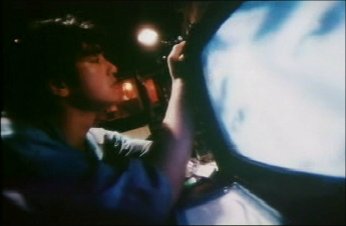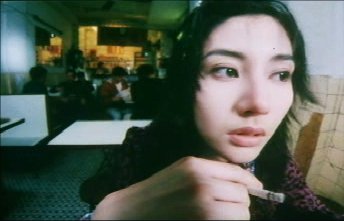|
Text and layout © Ed Shum, 2003. Ed Shum asserts the moral right to be identified as the author of this work |
|
Long Reviews |
|
But WKW is careful not to allow metaphor to shift the story into a political sphere: there is a context, but a meaning is not foisted on to it, and WKW avoids making the film a vehicle for any political opinion he may have. The same is true for the digs WKW makes about Hong Kong’s consumerist nature (for example, the many comparisons Takeshi makes between relationships and commerce). It is simply WKW’s way that his movies hold observation rather than being opinionated - a partisan view would result in his films losing their unique viewer connection. So what WKW does with the idea of Blondie, is to make him or it an amorphous concept which bleeds into Takeshi’s narrative. They hunt Blondie, the people in the cafe hunt (or are) Blondie, there is a blonde blow up doll, Takeshi’s own hair starts to ‘turn’ blond (or at least he turns it blonde). The concept ends up being the connection between him and Charlie - ironic, given that it connects her to her former lover. In the end, the blonde idea proves purely cosmetic as he realises that Charlie doesn’t requite his feelings. This actually comes as an epiphany, and Takeshi, now shorn of his blonde streaks, resolves to change his life. |
|
Review of Fallen Angels (1995) |
|
|
|
...Continued... [Page 3] |
|
End |
|
Then there is the true heart of the film, namely Takeshi’s relationship with his father, which shifts the film from being merely technically astounding to having the power to move at a profound level. Like the ice cream escapade, Takeshi is initially presented as the perennial comic protagonist, inflicting himself in various ways on his ‘ordinary’ father. The bond is latent, and all too easily do we end up taking it for granted. It is unlike the connection between Leon and Michelle, as we only see Takeshi’s point of view, but slowly we understand the importance of Takeshi and his father’s relationship. The most outstanding sequence is the camcorder escapade, where Takeshi tries to emulate the emotion and love encapsulated when his boss, Saito-san, sends a video home to his family in Japan (Takeshi has taken to working as an employee, conventionally, since his ‘epiphany’). So Takeshi takes the camcorder and proceeds to film his father, incessantly, and at all hours, to his father’s annoyance. The tape encapsulates their connection, and his father is aware of this as he later sneaks a peek at the footage. |
|
Of course, WKW isn’t the only filmmaker to look at a father-son relationship, but most filmmakers fall by the wayside, because the concept so easily becomes self-consciously sentimental and trite, and there is often little to add. But WKW’s genius is to be unconventional, and the camcorder sequence does this, capturing and encapsulating a whole field of emotion and saying more about the relationship than many other films put together. The reason why WKW doesn’t get bogged down here is because the sequence attempts to capture Takashi and his father’s relationship, which it does in a natural manner and without contrivance (after all, it is the character who shoots and edits the video, and the character who watches it). What WKW doesn’t do is to try to present an idealised analysis of an idealised relationship. In the end, just like the ice cream escapade, there is a sudden and unexpected move in mood which takes the viewer’s emotions by surprise. The father’s death makes the camcorder sequence suddenly tinged with sadness and bittersweet emotion. But there is also the characteristic WKW sense of hope: the video is the embodiment of Takeshi’s memories of his father (‘I’ll never taste his steaks again... but I’ll never forget how they tasted’), and it is the perfect medium to make an audience understand the memories too. And what is moving is the naturalness of what the video has captured: its improvised anarchy perfectly depicts the relationship without laying claim to any meaning or message. |
|
Despite the emotional content of what we have gone through with Takeshi: his epiphanies, his joys and his sorrows, he still must continue his life. But after his father’s death, the factual narrative seems unimportant, more like a series of epilogues than a coherent story. And again, WKW plays with the factual narrative as though it were merely a canvas: since the audience has witnessed Takeshi’s epiphany, they are expecting a life-affirming change in his existence. Yet now Takeshi is more alone than ever, and WKW carefully slips in the fact that he is back to his old life of crime (with hints of darker violence). Now, for all his zaniness and energy, like ‘Baby’, he is simply alone. But on initial viewing, audiences are fooled into riding the wave of the uplift generated by Takeshi’s hope, and may miss the narrative’s true direction. His ‘first love’, Charlie, ignores him, his crimes appear to take on a more violent form, and the risks of his way of life are more apparent than before. |
|
Candid camera: at the same time as being poignant and sweet, the camcorder sequence - used to connect Takeshi and his memories of his father - also serves as an insight into WKW’s notions of how memory interfaces with emotions in general, and how cinema can work with such a concept. On the surface the sequence may seem like another trick; another cinematography extreme, yet this time we connect the viewpoint’s subjectivity even more directly to the character - for a moment, the character is the auteur, and he is not trying to peddle, prove or push any point; there is no narrative significance, and neither is it a major character turning point: he is merely trying to lay down something he feels is of emotional importance |
|
Right at the end, we encounter a scene which appears to be one of Michelle’s, again in the ‘wilderness’ of another shabby locale - an eatery complete with its own ‘human backdrop’ - typical of the places we see her. Then, without any warning, the ‘human backdrop’ erupts into a fight, shot with brutal simplicity. As the rest of the combatants clear, we see a figure stir from where he has been beaten. To our surprise, it is Takeshi. But again, WKW moves our attention from the raw fact of the narrative, and we hear Takeshi’s voice-over expounding in a more philosophical direction, once more highlighting his hope. This is entirely out of kilter from what we have just seen, and it is easy to disengage from the narrative altogether, seeing it instead as a surreal backdrop to the ‘real’ emotional existence of the characters. But WKW is clearly challenging the viewer to rationalise what has just been seen, by deliberately placing events in such an unexpected, unexplained context. This allows the viewer to take an instinctive explanation from a variety of possibilities, and it is interesting that many won’t realise that Takeshi (together with an unidentified accomplice) are actually the assailants who start the fight, such is the oblique manner of portrayal. This narrative disregard is the culmination of the extremes which the facts of the story have reached, together with being the paradigm of how WKW has divorced our, and the characters’ emotions from their actual physical and social existence. |
|
The very final scene sees Michelle and Takeshi bringing the narrative threads together - yet not quite. The possibility of pairing various characters off is always an obvious one, but WKW knows better than to expect such neat, conclusive ‘fit’ (as proved by his obsessively disjunctive Days of Being Wild). Instead, each character makes clear to us the purely limited nature of their outlook. In fact, the key here is that there is no potential for anything lasting, and each settle for something purely transitory (as Michelle says ‘I know the road is a short one... but for now I’m feeling such warmth’). This, together with the final ants-eye view shot of the Hong Kong skyline, also serves as a reference to the purely transitory nature of Hong Kong, both politically and, inherently culturally, and what WKW appears to be showing is that such transience is the now, and that the future is not something to be taken for granted. |
|
Page: |
|
Page: |


|
Today is the first day of the rest of your life: Michelle faces the future after the end of her and Leon’s story. But nobody can rely on or predict the future... |